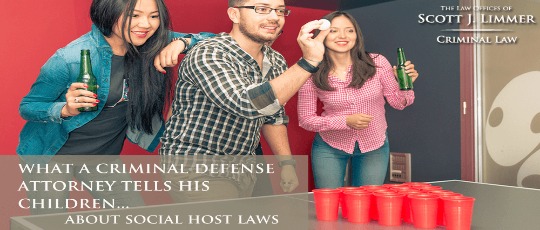Underage drinking is a difficult topic for any parent to handle. We all know it’s pretty much inevitable that our children are going to imbibe before their twenty-first birthday, but that doesn’t make it any easier to handle. As a father with two teenage daughters I find myself always wondering how to best manage this subject, especially now that they’re both heading off to college soon.
I’m not naïve enough to think they’ll abstain from drinking entirely, and I’m not convinced that sending our children off to college without any exposure to alcohol is the best course of action. After all the more you tell someone not to do something, the more likely they are to do it. And if you’ve continually told your kids never to drink and then send them off to college where drinking is rampant, they might not be prepared for their newfound freedom.
Some parents feel that kids should have a safe place to do things they might end up doing in college, like drinking. And perhaps by introducing your children to alcohol in a responsible way, you can take the forbidden excitement out of drinking, making them less likely to go to extremes at school.
But unfortunately, the law is not on your side for this one.
In both Nassau and Suffolk County, allowing minors to drink in your home can end with you being arrested and fined. The long term legal repercussions are relatively minor but the arrest is likely be covered by local news media (Patch, News 12, Newsday) and then quickly disseminated through Facebook community groups—meaning a lot of public embarrassment for you.
The last thing most people I know want is to be arrested, have to go to court a number of times and have that arrest be the first thing that comes up when you Google their name.
I understand kids drink, but if you allow them to drink in your home you must be aware of the possible consequences.
Social Host Liability
In both Nassau and Suffolk County, pursuant to their social host laws, it is illegal for anyone over age 18 who owns or rents a home to “knowingly allow the consumption of alcohol or alcoholic beverages by any minor” on the premises. The law also punishes any homeowner or tenant who learns that alcohol is being consumed by minors there and fails to take corrective action.
Just two years ago Suffolk County decided to raise the penalty category of this law from a violation to a misdemeanor crime, which also gives the police more freedom to investigate potential instances where they think underage drinking is taking place. You definitely don’t want that to be your home. In Nassau, violation of this law also constitutes a misdemeanor.
If it’s your first offense you could face fines of up to $500, and for second and subsequent offense you could be looking at thousand dollar fine and even possible jail time.
Social Host Law also extends liability for damage done by a person who consumed alcohol to also include those who provided it, and sometimes to those in whose residence the alcohol was consumed.
So for example, if your teen drinks too much at a party at the Smiths’ home, as the owners of the place where that happened, the Smiths may be held responsible for damage your intoxicated offspring happens to suffer, or even to cause. That may be true even if the Smiths did not provide the alcohol, didn’t know that drinking was going on, or weren’t even home when the drinking was occurring.
In some states (including Connecticut and New Jersey), the host can be held liable under a general social host liability law, which applies not just to minors, but to anyone permitted to drink to excess.
The bottom line is that it’s not a good idea to allow underage drinking in your home. And considering its possible for kids to do it anyway—especially if you leave them home alone one weekend—it’s better they know the law so that they hopefully don’t subject themselves, or you, to big-time legal liability.
What You Can Do to Limit Your Risk
- If they don’t already know, make sure your family understands what host liability is, and how serious its consequences can be. And while it’s far from the only reason your children should be careful in how much and with whom they may drink, it’s another powerful one. Make sure they know your ground rules for having friends over to your home, especially when you’re not there.
- When your kids entertain their friends in your home, don’t tolerate any use of alcohol by anyone under age 21; it would be better to keep the event completely alcohol-free (because it’s likely to be too difficult to prevent them from sharing with younger guests).
- If you find an underage guest consuming alcohol, you need to promptly demand it stop, or the minor leave the premises (but if the underage guest appears intoxicated, don’t let him or her drive); call a parent or guardian instead.
- Finally, always set a good example for them. Let them see that you drink responsibly and insist all guests do the same. It’s the best way to avoid becoming liable for their acts.
